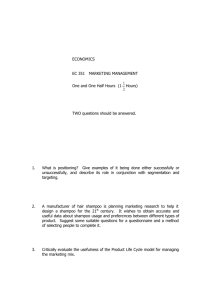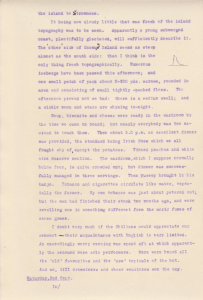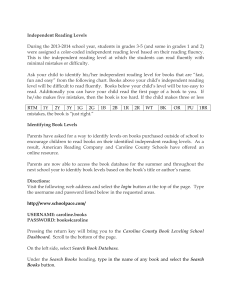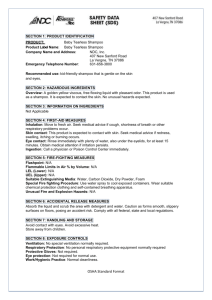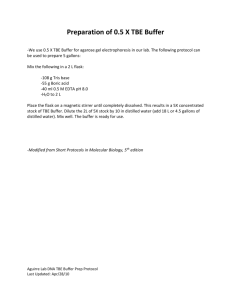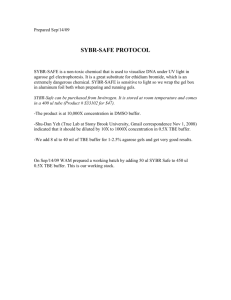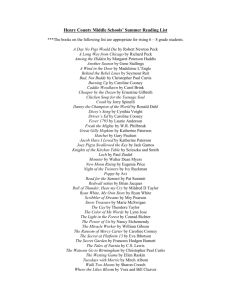Can This Brand Be Saved?
advertisement
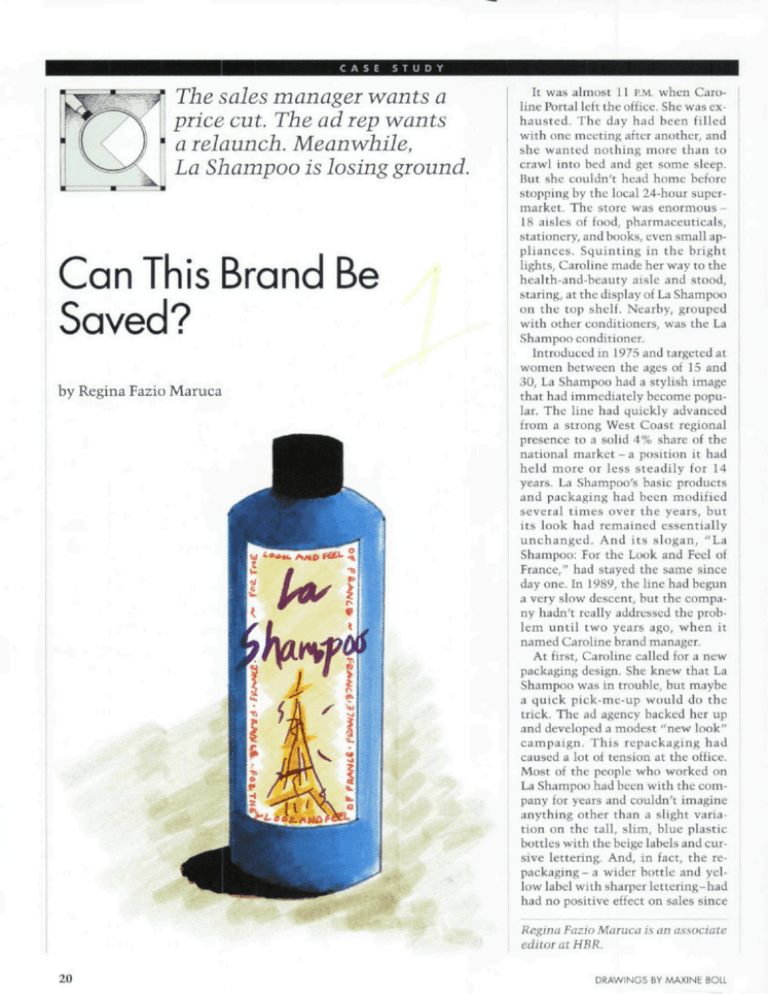
C A S E S T U D Y The sales manager wants a price cut. The ad rep wants a relaunch. Meanwhile, La Shampoo is losing ground. Can This Brand Be Saved? by Regina Fazio Maruca It was almost 11 r.M, when Caroline Portal left the office. Sbe was exhausted. The day bad been filled with one meeting after another, and she wanted nothing more than to crawl into bed and get some sleep. But she couldn't bead home before stopping by the local 24-hour supermarket. The store was enormous 18 aisles of food, pharmaceuticals, stationery, and books, even small appliances. Squinting in the bright lights, Caroline made her way to the health-and-beauty aisle and stood, staring, at the display of La Shampoo on tbe top sbelf. Nearby, grouped with otber conditioners, was the La Shampoo conditioner. Introduced in 1973 and targeted at women between the ages of 15 and 30, La Shampoo had a stylish image that bad immediately become popular. Tbe line bad quickly advanced from a strong West Coast regional presence to a solid 4% share of tbe national market - a position it had held more or less steadily for 14 years. La Sbampoo's basic products and packaging had been modified several times over the years, but its look had remained essentially unchanged. And its slogan, "La Shampoo: For the Look and Feel of France," had stayed the same since day one. In 1989, the line had begun a very slow descent, but tbe eompany hadn't renlly addressed tbe problem until two years ago, when it named Caroline brand manager. At first, Caroline called for a new packaging design. Sbc knew that La Sbampoo was in trouble, but maybe a quick pick-me-up would do the trick. The ad agency backed her up and developed a modest "new look" campaign. Tbis repackaging bad caused a lot of tension at the office. Most of the people wbo worked on La Shampoo had been with the company for years and couldn't imagine anything other than a slight variation on the tall, slim, blue plastic bottles with the beige labels and cursive lettering. And, in fact, the repackaging - a wider bottle and yellow label witb sbarper lettering-had bad no positive effect on sales since Regina Fazio Maiuca is an associate editor at HBR, 20 DRAWINGS BY MAXINE BOLL C A S E S T U D Y its introduction cigbt months ago: tbe numbers bad continued their slow decline. Caroline wondered if many customers had even noticed the change. Caroline sbifted her gaze down to tbe products displayed at eye level. All newer than La Shampoo, All starting to grab market share. But with no consistent recipe for success-at least none that she could discern. Some claimed to be "green" products, charged a premium, and made out like bandits. One touted a "Low, Low, Low Price!" and sold huge quantities. La Shampoo bad always been a bigb quality product, a bit more expensive than its competitors, and its marketing strategy other than the package redesignhad remained consistent over the years. La Sbampoo had always sold on an image of European mystique. Clearly, tbough, that message wasn't working anymore. Bleary-eyed, Caroline left the health and-beauty aisle and walked slowly toward the exit, deep in thougbt. The next morning, Caroline was at her desk early, doing some lastminute prep work for an 8 A.M. marketing meeting with Eric Woolf, her product sales manager, and Beth Hanson, a representative of tbe advertising agency that held the La Shampoo account. Both bad submitted proposals before the meeting; eacb document was thoughtfully eonstructed and presented a cogent argument. However, the two recommendations were radically different. Beth thought that La Shampoo needed a strong brand campaign. Eric wanted to compete on price. Caroline wasn't convinced either of them had tbe right recipe, but she did feel strongly tbat the middle road wasn't an option. At the meeting, Eric spoke first. "I'm not going to waste anyone's time mincing words. We need a short-term solution as well as a long-term plan. Some of our key accounts are in jeopardy, and tbe only way to save tbem is to lower our prices permanently." "That's not a real solution," Beth countered. "What happens after you cut the price? The competing brands HARVARD BUSINESS REVIEW will lower their prices, too, and then we'll be in the same situation we're in now." "You don't seem to be getting the point, Beth," Erie snapped. "La Shampoo is dead unless we discount right now. We need to buy some time in order to save tbe brand." Caroline raised her eyes toward tbe ceiling but said nothing. Eric was known for getting riled up pretty quickly, and today, it seemed, was no exception. His style worked for revving up his sales force, but it didn't go over as well in a small conference room. Sfptember-Octobi:r 1994 "And you don't seem to understand tbat you won't be buying any time by making that kind of move," Betb sbot back. "If you drop the price, you won't bave a brand left to build up." Eric stood up and grabbed a black marker. He quickly outlined a bar graph on the wall board depicting national market-sbare levels of the top sbampoo brands and then circled the bar representing La Sbampoo, just below the 3% mark. "Here is where we are," he said. He drew another circle below and to the right of the first one. "Here is 21 C A S E S T U D Y Beth Hanson wmmmof »tin where we'll be iti three months without some sort of price advantage." He jahbed at the board, crushing the marker's felt tip. "I'm telling you, we don't have the time to develop and roll out a completely new ad campaign. After we've stabilized the account, maybe. But not now. I'm even beginning to think that trying to protect any kind of brand name is a losing battle. You've read the papers - brands are going the way of the dinosaur." "You're too elose to the issue to see what's good for the product," Beth said. 22 "And you're too concerned with your own interests," Eric countered. "At bottom, you want a new advertising campaign because it will be good for your company." The debate went around in circles. After a mere 25 minutes, Caroline could see that discussion of this kind wouldn't solve anything. She called the meeting to a halt. "I'm going to have to review your proposals again and come to a decision," she said. "I'd like a commitment from each of you that you'll support the plan I choose, even if it is not yours. You hoth know that the only way either of these options will work is if we pull together at every level-and those of us at the top will have to send that message." Beth nodded. "I'll support that," she said. Eric stood up. "I will as well," he said. "But if you're seriously considering a new advertising eampaign, I think you'll find out pretty quickly that we're too late for that kind of move." He gathered his papers and quickly left, letting the door slam shut behind him. Caroline was temporarily at a loss for words. She hadn't expected Eric HARVARD BUSINESS REVIEW September-October 1994 'ce Wbo/f P-2 it ita th. cut. and. I t to dr. Of 'poo •t th. you l o , •la thr, th. ler the •r ct. no •Ion ' ua that th ent. lat 'it, •Kith • r bad. Che; ion We ^gh~ cut 9" the - If you Jce •P th. cut our and a i t •mat th. With o u t th, •la have. io in t h . paat t o the' aa th. hav.i n g a h And, Pian Poa o. '•pin 9 the Our ret to. ° th. o<te do, Of on. n't can to th. th, leif th. thi to leave so abruptly. She told Beth that she'd get back to both of them within a week and followed Eric into the hall, but he was already gone. Back in her office, Caroline returned a few phone calls and then turned her attention to her E-mail. She had only one message-from Marni Shin, director of new product development. "Caroline, I'd like to schedule a meeting with you ASAP to discuss the combination shampoo/conditioner our team has been working on. We should have a preliminary conversation about La Shampoo, and whether or not you think our new comho should be rolled out as part of the La Shampoo line. I think it should. Our research indicates that people are increasingly demanding more convenient products like combos. Without some kind of a shot in the arm. La Shampoo will be at the end of its life cycle sooner than we'd all like to think. And, frankly, it will be an embarrassment to the company if we don't introduce a combo soon. We've been ready for four months." "As if I didn't have enough to deal with," Caroline said under her HARVARD BUSINESS REVIEW September-October 1994 breath. The market research was so cloudy that it could be used to support almost any argument. And Caroline had heard Marni talk ahout new product launches before. Marni clearly had no concept of what was needed to build a hrand. But Marni's limitations weren't the issue right now. La Shampoo was the problem, and some decision about the marketing plan had to be made soon. HBR's cases are derived from the experiences of real companies and real people. As written, they are hypothetical, and the names used are fictitious. 23
